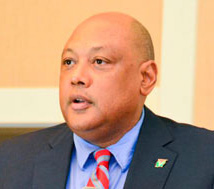The Ministry of Natural Resources will be signing a Memorandum of Understanding (MoU) with the Pesticides and Toxic Chemicals Control Board (PTCCB) and other stakeholders to make it harder for persons to import mercury as the country aims to reduce its wanton use in the mining sector.
This was revealed by Minister of Natural Resources Raphael Trotman yesterday at a press conference, where he updated the news media on several matters relating to his portfolio.
He said that his ministry has signed MoUs with the World Wildlife Fund and the National Toshaos Council to “grow stronger.” Another was signed with the Government of Chile and Trotman said that they also have a declaration of intent with the Government of South Africa with a draft MoU in the works.
Most importantly, he said, the ministry will be signing a joint MoU with the PTCCB, the Guyana Geology and Mines Commission (GGMC) and the Environmental Protection Agency (EPA) regarding the importation of mercury – a substance that is widely used in the gold extraction process here.
The toxic effects of mercury have long been of concern. With its use largely unregulated, its entering into the environment and accumulation up the food chain, where it can cause a range of negative impacts on ecosystems and humans, have seen global efforts grow to curtail its use.
Trotman was not open to giving much details about the MoU and what it will cover until August 30th, when it will be signed. He said that the document is still being hammered out by the agencies.
“It really says that you just can’t import mercury into Guyana. You have to have permissions of the three entities and they are working in collaboration with each other. The draft is available but it will be shared in the press when signed,” he said.
The minister contended that the MoU will only affect the sector in a positive way. He said that his ministry often sees numerous requests for the importation of the chemical.
“I often say that last year, I refused to give permission for 30,000 kilogrammes of mercury to be imported from Mexico. I wondered what would one want to do with 30,000 kgs of mercury and that is one importer,” Trotman said. He added that while there are multiple importers, there are indications that the chemical is moving across the country’s borders.
According to the minister, they are monitoring the stock in hand and will ensure that there are quotas that will have to remain constant.
Trotman emphasised that the ministry and the collaborating agencies are going to ensure that there is always a limited amount available at all times and there will not be an open importation process.
“You have to account for what you have done with your quota, how it has been disposed of, to which miner or miners have used it and how we can be able to track it much differently and better,” he explained.
When questioned on whether he has rejected any more requests for importation, Trotman responded, “I wouldn’t say reject but certainly we haven’t made it easy. In some cases, we have not granted permission for the quantities asked for.”
He said that they will review the quantities a trader would have imported the previous year and compare it to his/her other requests. “If it has exceeded the quota, it will be brought to his/her attention that they have reached that quota and that it has to be properly accounted for,” he said.
Trotman also paid compliments to the Guyana Gold and Diamond Miners Association, which, he said, has been supportive and cooperative.
“We are doing a better job and we are seeing the [Guyana Revenue Authority], EPA and GGMC working together to get a much better sense of what is coming in and how it is being stored,” he added.
In 2017, President David Granger had recommitted Guyana to eliminating the use of mercury by 2027 as he addressed the High-level Side Event of the 1st Conference of Parties to the Minamata Convention on Mercury in Geneva, Switzerland.
“Guyana reaffirms its commitment to the implementation of the Minamata Convention. My country set itself the goal of reducing mercury emissions by 55 per cent within the next five years and to eliminate mercury use by 2027,” Granger had said.
Noting that Guyana is pursuing a model of development aimed at becoming a ‘green state’, the president said that the country needs the Minamata Convention on Mercury.
In Guyana, mercury is mainly used in the gold mining industry. Granger pointed out to the meeting that the artisanal, small- and medium-scale gold mining sector is significant to the national economy. He noted that the sector produced over 700,000 ounces of gold or 12.1 per cent of the Gross Domestic Product (at 2006 prices) in 2016 of which 67.7 per cent of total gold production came from more than 3,000 artisanal, small- and medium-scale mining enterprises.
He further noted that it employs more than 18,000 persons directly and supports the livelihoods of more than 100,000 persons, indirectly and was the country’s single, largest foreign exchange earner.






